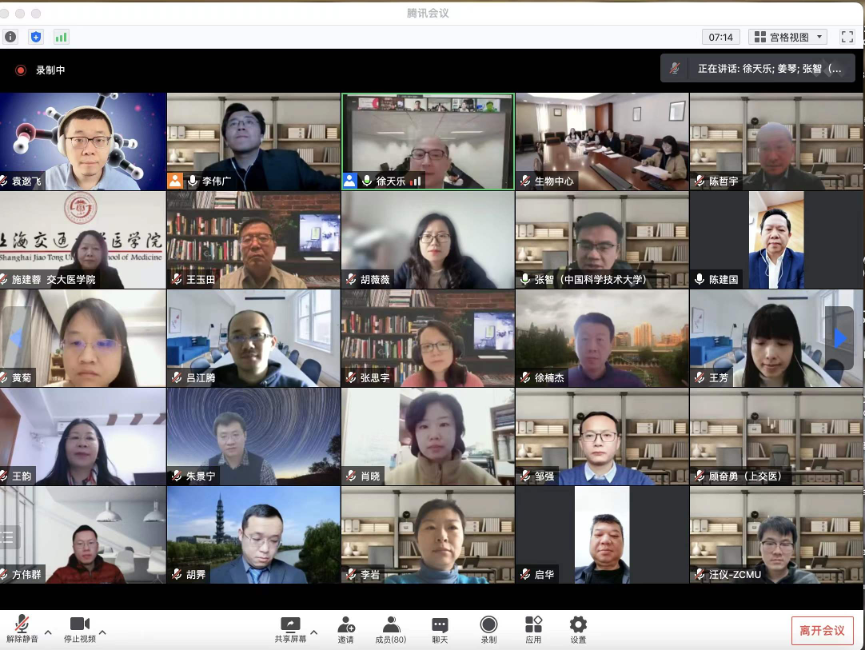Science and Technology Innovation 2030-Brain Science and Brain-inspired Artificial Intelligence Key Project of "Evolution of Emotion and the Mechanism of Neural Circuits Interaction with Cognition" led by Professor Tian-le Xu of Shanghai Jiaotong University School of Medicine was launched online successfully on 2 April 2022. Director Deping Wang, deputy director Jinqiang Tian, and department head Xin Zhang of China Biotechnology Development Center, Deputy Secretary of CPC professor Jianrong Shi of Shanghai Jiao Tong University School of Medicine (SJTUSM), director Qihua Fu and deputy director Fenyong Gu of Science and Technology Development Office of SJTUSM, deputy dean Qiang Zou of SJTU College of Basic Medical Sciences, project consulting expert and academician Yutian Wang of Shenzhen Institutes of Advanced Technology (SIAT) of the Chinese Academy of Science (CAS), professor Yun Wang of Peking University, vice president Jianguo Chen of Huazhong University of Science and Technology, deputy director Yangang Sun of Institute of Neuroscience (ION) Brian Intelligence Center of CAS, professor Zhi Zhang of The University of Science and Technology of China, as well as PI (Principle Investigator), over 100 academic elites and the graduate students attended this meeting.

This key project was led by Professor Tian-le Xu of SJTUSM, containing 15 PI from 8 institutions, including Shanghai Jiao Tong University, Fudan University, Zhejiang University, Nanjing University, Tongji University, Chinese Institute for Brain Research, Beijing (CIBR, Beijing), Zhejiang Chinese Medical University and Shuguang Hospital affiliated to Shanghai University of Traditional Chinese Medicine. Project based on the guideline of Science and Technology Innovation 2030-Brain Science and Brain-inspired Artificial Intelligence Key Project, proposing research hypothesis of dynamic transition from mood to emotion, from two kinds of representative of negative and positive emotions: fear and happiness, to develop a theoretical framework for the neural mechanism of mood and emotion by analyzing the neural circuit basis of instinctive cognition and acquisition.
At the launching meeting, deputy secretary Jianrong Shi gave a speech on behalf of the supporting institutes. SJTUSM focused on brain science, she mentioned. During the 13th Five-Year Plan period, under the leadership of Professor Tian-le Xu, the innovation team of Shanghai Municipal Education Commission related to brain science has expanded from initially 3 to currently 7, integrating the brain science research strength of the School of Medicine and affiliated hospitals. In addition, the "Disease-oriented Cross-integration platform of Brain Science in SJTUSM" has been established in the 14th Five-year Plan, taking fully advantages of the high quality clinical resources and interdisciplinary integration of the School of Medicine and Shanghai Jiaotong University, focusing on the 3 core groups (people with mental disease, aged degenerative, and children development). 3 supporting platforms for technological innovation of brain diseases (basic research platform, clinical transformation platform and medical imaging big data platform) will be built, and "basic-clinical-industrial" brain science research system will be finally formed to support the National Brain Plan.
Deping Wang, director of China Biotechnology Development Center, represented key project management institutions and provided valuable suggestions in terms of project implementation, process management and other aspects, pointing out that the research details, quality control and quantitative scientific research output should be carried out actively. In combination with his experience of similar project management, he put forward earnest expectations for the implementation of the project.
Later, professor Tian-le Xu, the principal of the project and the leader of the second project, introduced the overall project background, research content and objective, clarified the respective tasks and division of team members. The expected results of the project are prospected from the aspects of new model, new loop, new technology, new molecule, new theory, new paradigm, new transformation and new cooperation. After that, PI Nanjie Xu of SJTUSM, professor Zhong Chen of Zhejiang Chinese Medicine University, professor Zheyu Chen of Shuguang Hospital affiliated to Shanghai University of Traditional Chinese Medicine and professor Jingning Zhu of Nanjing University represented respectively, introduced the research content and received a heated discussion with the experts online.
In the afternoon, each research member discussed their future works, reported their personal expertise and work basis, and put forward innovative ideas and expected contributions to the project. Team members and consulting experts had a heated discussion and proposed constructive cooperation intention. Experts also praised the project team for working hard and focusing on scientific research during the period of the pandemic.




